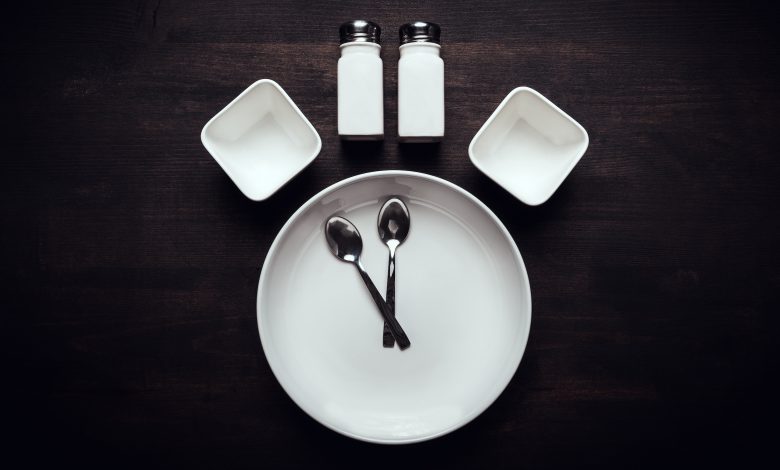
Can you lose weight in Ramadan safely?
هل يمكن فقدان الوزن في رمضان بشكل آمن؟
Many fasting people around the world monitor their weight rates for fear of gaining extra weight during the holy month of Ramadan, but the question remains. How can a proper diet for weight loss in the holy month be safely followed, without suffering from a setback in activity, or symptoms of dizziness, stress and dehydration? Are there certain meals to compensate the fasting person’s body for the water and minerals it loses during fasting?
According to Al Jazeera Net, dr. Mohammed Abdeslam, a consultant on therapeutic nutrition, obesity and weight loss, advises those who want to continue weight-loss diets during Ramadan to divide meals into 3 instead of just iftar and suhoor, including an evening meal between them 3 hours after iftar.
This intermediate meal is useful in avoiding eating large amounts at iftar or suhoor, and those who want to slim down without dizziness or headache should make sure that these meals include 6 essential food groups: fruits, vegetables, carbohydrates, proteins, oils and dairy, but in reasonable quantities of course.
Abdeslam points to a very useful meal to compensate the body of the fasting person who lost water and minerals throughout the hours of fasting, namely watermelons with cheese because they contain glucose and amino acids needed to avoid dehydration, and it is recommended to eat sufficient amounts of water, hibiscus, tamarind and other natural juices during the iftar period.
** Suhoor and tea
For his part, nutritionist Salah Jad advises eating slow-digesting foods on suhoor that contain complex carbohydrates such as beans, lentils, oats, boiled potatoes without peeling them, which reduces cholesterol, as well as to avoid feeling hungry and therefore there will be no binge.
“Eating fruit, especially apples without peeling them on suhoor, increases weight loss and gives a feeling of satiety during fasting hours,” Jad said, adding that eating roasted beans increases the sense of satiety as well as containing protein, and minerals that help maintain fitness.
The nutritionist emphasizes the need to eat an iftar containing all food groups so that the body maintains its balance and does not feel weak and tired, for each type of group, carbohydrates for example we should choose between rice, pasta, potatoes or bread to supply energy to the body without large calories, meat, poultry or fish as a good protein source.
Those who want to fast and slim down without dryness or suffering from a great thirst should avoid too many caffeinated drinks such as tea, which is diuretic, and thus lead to the body losing a lot of minerals, according to the nutritionist.
يراقب العديد من الصائمين حول العالم معدلات وزنهم خوفاً من اكتساب وزن زائد خلال شهر رمضان المبارك، لكن يبقى السؤال.. كيف يمكن اتباع نظام غذائي مناسب لفقدان الوزن في الشهر المبارك بشكل آمن، ودون المعاناة من انتكاسة في النشاط، أو ظهور أعراض الدوخة والإجهاد والجفاف؟ وهل هناك وجبات معينة لتعويض جسم الصائم ما يفقده من ماء وأملاح خلال الصيام.
استشاري التغذية العلاجية وعلاج السمنة وإنقاص الوزن الدكتور محمد عبد السلام ينصح، بحسب الجزيرة نت، من يريدون الاستمرار في حميات إنقاص الوزن خلال شهر رمضان إلى تقسيم الوجبات إلى 3 بدلا من الاقتصار على الإفطار والسحور فقط، بحيث تشمل وجبة مسائية بينهما بعد 3 ساعات من الانتهاء من الإفطار.
وتعود فائدة هذه الوجبة الوسيطة في تجنب تناول كميات كبيرة في الإفطار أو السحور، وعلى من يريد تخسيسا دون دوخة أو صداع أن يحرص على أن تشمل تلك الوجبات 6 مجموعات غذائية ضرورية وهى الفواكه والخضراوات والكربوهيدرات والبروتينات والزيوت والألبان، ولكن بكميات معقولة بالطبع.
ويشير عبد السلام إلى وجبة مفيدة للغاية لتعويض جسم الصائم فاقد المياه والأملاح طوال ساعات الصوم، وهي البطيخ مع الجبنة لاحتوائها على الغلوكوز والأحماض الأمينية اللازمة لتجنب الجفاف، كما ينصح بتناول كميات كافية من الماء والكركديه والتمر الهندي وغيرها من العصائر الطبيعية خلال فترة الإفطار.
** السحور والشاي
من جهته ينصح خبير التغذية صلاح جاد بتناول أطعمة بطيئة الهضم على السحور والتي تحوي كربوهيدرات معقدة كالفول والعدس والشوفان، والبطاطس المسلوقة دون أن نزع قشرتها، وهو ما يقلل نسبة الكوليسترول في الدم، وكذلك لتجنب الشعور بالجوع لأطول فترة كي لا تحدث حالة من الشراهة.
وقال جاد “تناول الفاكهة خاصة التفاح دون تقشيره بوجبة السحور يزيد من فقدان الوزن ويمنح شعورا بالشبع خلال ساعات الصوم” كما أن تناول الفول المدمس يزيد إحساس الشبع إضافة إلى احتوائه على بروتين، وعلى معادن تساعد في الحفاظ على اللياقة البدنية.
ويؤكد خبير التغذية ضرورة تناول وجبة إفطار تحتوي على جميع المجموعات الغذائية حتى يحافظ الجسم على توازنه وعدم الشعور بالضعف والإرهاق، لكل نوع واحد من كل مجموعة، فالكربوهيدرات مثلا يجب أن نختار بين الأرز أو المكرونة أو البطاطس أو الخبز لمد الجسم بالطاقة دون سعرات حرارية كبيرة، واللحم أو الدواجن أو السمك كمصدر بروتين جيد.
وعلى من يريد صياما وتخسيسا دون جفاف أو معاناة الشعور الكبير بالعطش أن يتجنب الإكثار من المشروبات التي تحوي مادة الكافيين مثل الشاي الذي يعد مدرا للبول، وبالتالي يؤدي لفقدان الجسم الكثير من الأملاح، وفق خبير التغذية.



